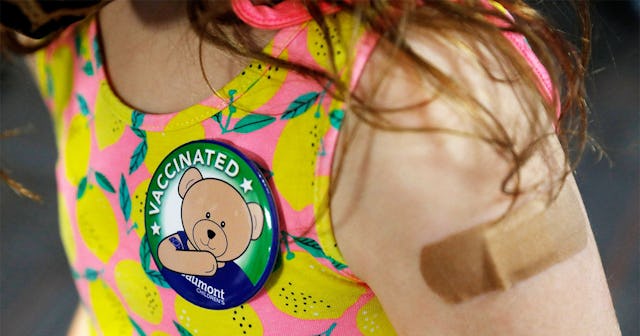Pfizer Is Testing A Third COVID-19 Vaccine Dose For Kids

Pfizer has announced that it’s testing the results of giving kids a third dose of its vaccine, hoping it will boost immune responses
As the omicron variant tears across the U.S., Pfizer is working on a way to better protect kids from that and other forms of COVID-19. After the company announced some disappointing results from its vaccine trial for 2-5-year-olds, it’s now testing a third dose on that age group, to see if the result is a better immune response than the kids showed after the standard two doses.
In trials, kids ages 2 and under showed a strong immune response, while kids ages 2-5 did not. After that finding, Pfizer made the decision to try adding a third dose for kids ages 2-5, while testing booster shots for kids ages 5-12 at the same time. Booster shots have already been authorized for everyone over the age of 16.
Dr. William Moss, executive director of the International Vaccine Access Center at the Johns Hopkins Bloomberg School of Public Health, said that while the lack of immune response in kids ages 2-5 was disappointing, it’s important to keep in mind that the dose used in that trial was just 3 micrograms. Currently, adults are given 30 micrograms, while kids 5-11 are given 10 micrograms. While it’s still not totally clear why kids ages 2-5 didn’t produce a strong immune response in the trial, many experts believe that the low dose, coupled with how much a child’s body weight can vary during that age range, is likely a factor.
Another possible reason is the change in the coronavirus itself. When Pfizer held a Phase I trial that helped the company decide on that dosage, alpha was still the dominant strain in the U.S. Since then, delta became dominant, and now omicron. It’s possible that the vaccines being tested in young kids are just slightly less effective against these newly mutated forms of the virus.
“In my mind, delta is definitely playing a role because the initial studies were done on alpha for the dosing,” said Dr. Simon Li, director of the division of pediatric critical care at Rutgers Robert Wood Johnson School of Medicine. “We know that there is definitely reduced efficacy — not a horrible one, but a little bit of a reduction — against delta, and that definitely is playing a part.”
The bottom line is that there are still many unknowns about how to best protect kids from COVID — but it’s important to remember that some of the world’s best doctors and scientists are working hard to find the best solution.